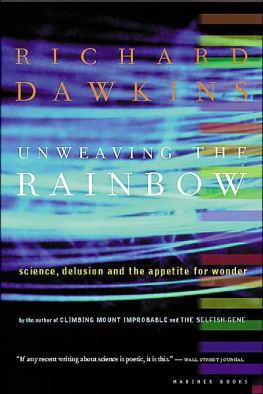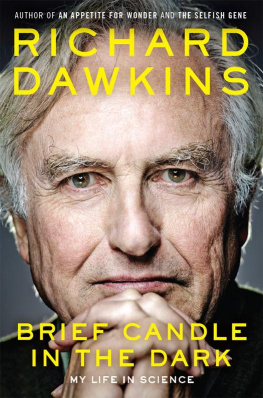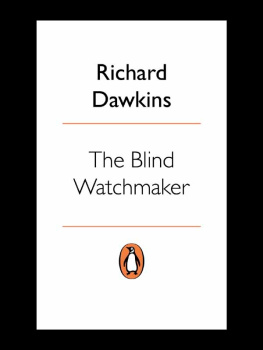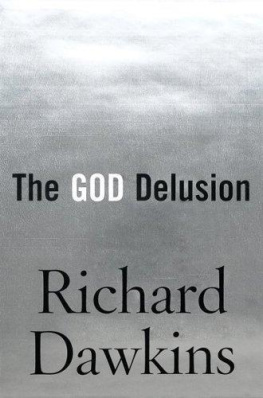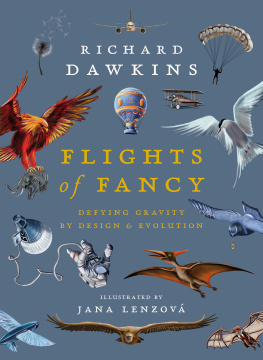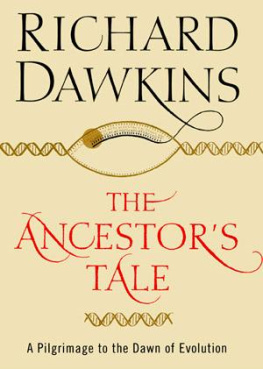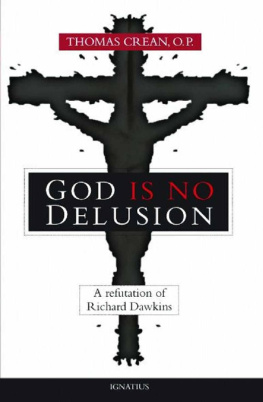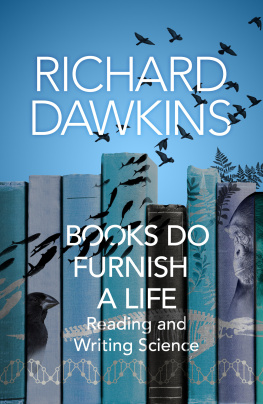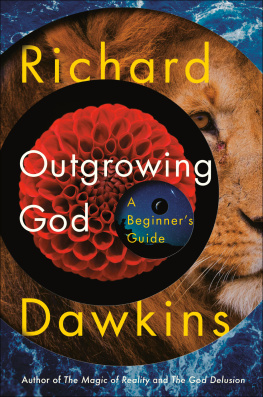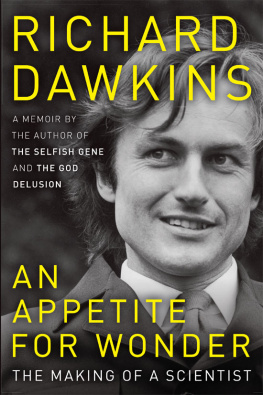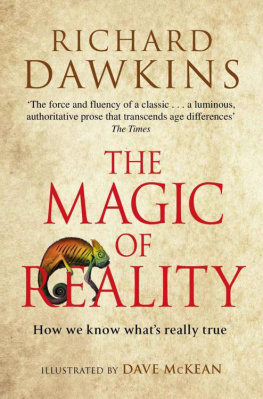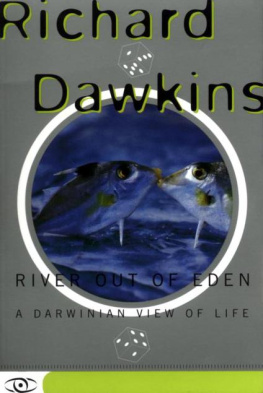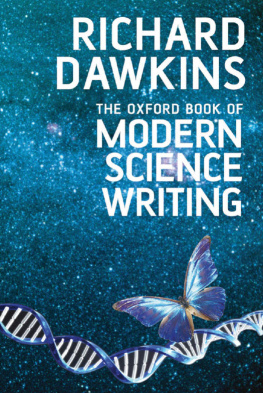A MARINER BOOK
HOUGHTON MIFFLIN COMPANY
BOSTON NEW YORK
First Mariner Books edition 2000
Copyright 1998 by Richard Dawkins
All rights reserved
For information about permission to reproduce
selections from this book, write to Permissions,
Houghton Mifflin Company, 215 Park Avenue South,
New York, New York 10003.
Library of Congress Cataloging-in-Publication Data
Dawkins, Richard, date.
Unweaving the rainbow : science, delusion and the
appetite for wonder / Richard Dawkins.
p. cm.
Includes bibliographical references and index.
ISBN 0-395-88382-2
ISBN 0-618-05673-4 (pbk.)
ISBN 978-0-618-05673-6 (pbk.)
1. Science Philosophy. 2. Science news. I. Title.
Q 175. D 33 1998
501dc21 98-40879 CIP
Acknowledgment is made to the following for
permission lo use extracts from 'Passion' by Kathleen
Raine, reprinted by permission of the author;
'Agamemnon's Tomb' by Sacheverell Silwell, reprinted
by permission of David Higham Associates;
'Unpredictable But Providential (for Loren Elseley)'
by W. H. Auden, reprinted by permission
of Faber and Faber Ltd.
The moral right of the author has been asserted.
Printed in the United States of America
DOC 10 9 8 7 6
For Lalla
CONTENTS
PREFACE
1 THE ANAESTHETIC OF FAMILIARITY
2 DRAWING ROOM OF DUKES
3 BARCODES IN THE STARS
4 BARCODES ON THE AIR
5 BARCODES AT THE BAR
6 HOODWINKED WITH FAERY FANCY
7 UNWEAVING THE UNCANNY
8 HUGE CLOUDY SYMBOLS OF A HIGH ROMANCE
9 THE SELFISH COOPERATOR
10 THE GENETIC BOOK OF THE DEAD
11 REWEAVING THE WORLD
12 THE BALLOON OF THE MIND
SELECTED BIBLIOGRAPHY
INDEX
PREFACE
A foreign publisher of my first book confessed that he could not sleep for three nights after reading it, so troubled was he by what he saw as its cold, bleak message. Others have asked me how I can bear to get up in the mornings. A teacher from a distant country wrote to me reproachfully that a pupil had come to him in tears after reading the same book, because it had persuaded her that life was empty and purposeless. He advised her not to show the book to any of her friends, for fear of contaminating them with the same nihilistic pessimism. Similar accusations of barren desolation, of promoting an arid and joyless message, are frequently flung at science in general, and it is easy for scientists to play up to them. My colleague Peter Atkins begins his book The Second Law (1984) in this vein:
We are the children of chaos, and the deep structure of change is decay. At root, there is only corruption, and the unstemmable tide of chaos. Gone is purpose; all that is left is direction. This is the bleakness we have to accept as we peer deeply and dispassionately into the heart of the Universe.
But such very proper purging of saccharine false purpose; such laudable tough-mindedness in the debunking of cosmic sentimentality must not be confused with a loss of personal hope. Presumably there is indeed no purpose in the ultimate fate of the cosmos, but do any of us really tie our life's hopes to the ultimate fate of the cosmos anyway? Of course we don't; not if we are sane. Our lives are ruled by all sorts of closer, warmer, human ambitions and perceptions. To accuse science of robbing life of the warmth that makes it worth living is so preposterously mistaken, so diametrically opposite to my own feelings and those of most working scientists, I am almost driven to the despair of which I am wrongly suspected. But in this book I shall try a more positive response, appealing to the sense of wonder in science because it is so sad to think what these complainers and naysayers are missing. This is one of the things that the late Carl Sagan did so well, and for which he is sadly missed. The feeling of awed wonder that science can give us is one of the highest experiences of which the human psyche is capable. It is a deep aesthetic passion to rank with the finest that music and poetry can deliver. It is truly one of the things that makes life worth living and it does so, if anything, more effectively if it convinces us that the time we have for living it is finite.
My title is from Keats, who believed that Newton had destroyed all the poetry of the rainbow by reducing it to the prismatic colours. Keats could hardly have been more wrong, and my aim is to guide all who are tempted by a similar view towards the opposite conclusion. Science is, or ought to be, the inspiration for great poetry, but I do not have the talent to clinch the argument by demonstration and must depend, instead, on more prosaic persuasion. A couple of the chapter titles are borrowed from Keats; readers may also spot the occasional half-quotation or allusion lacing the text from him (as well as others). They are there as a tribute to his sensitive genius. Keats was a more likeable character than Newton and his shade was one of the imaginary referees looking over my shoulder as I wrote.
Newton's unweaving of the rainbow led on to spectroscopy, which has proved the key to much of what we know today about the cosmos. And the heart of any poet worthy of the title Romantic could not fail to leap up if he beheld the universe of Einstein, Hubble and Hawking. We read its nature through Fraunhofer lines'Barcodes in the Stars'and their shifts along the spectrum. The image of barcodes carries us on to the very different, but equally intriguing, realms of sound ('Barcodes on the Air'); and then DNA fingerprinting ('Barcodes at the Bar'), which offers the opportunity to reflect on other aspects of the role of science in society.
In what I call the Delusion section of the book, 'Hoodwink'd with Faery Fancy' and 'Unweaving the Uncanny', I turn to those ordinary superstitious folk who, less exalted than poets defending rainbows, revel in mystery and feel cheated if it is explained. They are the ones who love a good ghost story, whose mind leaps to poltergeists or miracles whenever something even faintly odd happens. They never lose an opportunity to quote Hamlet's
There are mare things in heaven and earth, Horatio,
Than are dreamt of in your philosophy.
and the scientist's response ('Yes, but we're working on it') strikes no chord with them. For them, to explain away a good mystery is to be a killjoy, just as some Romantic poets thought about Newton's explaining of the rainbow.
Michael Shermer, editor of Skeptic magazine, tells a salutary story of an occasion when he publicly debunked a famous television spiritualist. The man was doing ordinary conjuring tricks and duping people into thinking he was communicating with dead spirits. But instead of being hostile to the now-unmasked charlatan, the audience turned on the debunker and supported a woman who accused him of 'inappropriate' behaviour because he destroyed people's illusions. You'd think she'd have been grateful for having the wool pulled off her eyes, but apparently she preferred it firmly over them. I believe that an orderly universe, one indifferent to human preoccupations, in which everything has an explanation even if we still have a long way to go before we find it, is a more beautiful, more wonderful place than a universe tricked out with capricious, ad hoc magic.
Paranormalism could be called an abuse of the legitimate sense of poetic wonder which true science ought to be feeding. A different threat comes from what may be called bad poetry. The chapter on 'Huge Cloudy Symbols of a High Romance' warns against seduction by bad poetic science; against the allure of misleading rhetoric. By way of example, I look at a particular contributor to my own field whose imaginative writing has given him a disproportionateand I believe unfortunateinfluence on American understanding of evolution. But the dominant thrust of the book is in favour of good poetic science, by which I don't, of course, mean science written in verse but science inspired by a poetic sense of wonder.

